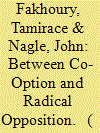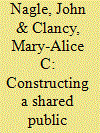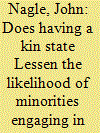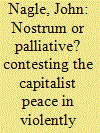| Srl | Item |
| 1 |
ID:
158290


|
|
|
|
|
| Summary/Abstract |
This article provides a comparative analysis of two types of power-sharing: Lebanon's corporate version and Northern Ireland's relatively liberal arrangements. Our aim is to explore whether these power-sharing institutions augment or stymie gender and LGBTQ equality, while also illuminating the complex ways in which LGBTQ movements conceptualize power-sharing. We argue that while Northern Ireland's liberal arrangements, predicated on a minority rights regime, theoretically offer opportunities for gender and LGBTQ mobilization and equality, these rights claims are frustrated as they become embroiled in the wider ethnonational conflict for group rights. In Lebanon's corporate system, alternatively, where gender and LGBTQ rights are absent, feminist and LGBTQ movements identify power-sharing as institutionalizing patriarchy and homophobia and thus engage in a radical campaign of opposition to consociationalism.
|
|
|
|
|
|
|
|
|
|
|
|
|
|
|
|
| 2 |
ID:
111491


|
|
|
|
|
| Publication |
2012.
|
| Summary/Abstract |
In order to bolster sustainable peace building in violently divided societies, a normative suggestion is that efforts should be made to construct a shared public identity that overarches ethnic divisions. A number of different centripetal/transformationist processes are identified as engineering a shared identity in comparison to consociational arrangements, which are accused of institutionalising ethnic differences and perpetuating conflict. These transformationist approaches essentially rest on the premise that because ethnicity is constructed it can be reconstructed into new, shared forms. Looking at Northern Ireland, we argue that there are limits to the extent that ethnicity can be reconstructed into shared identities. By analysing consociational and centripetalist/transformationist approaches to division, we conclude that although consociationalism will probably not deliver a common identity, it does provide a robust form of conflict regulation.
|
|
|
|
|
|
|
|
|
|
|
|
|
|
|
|
| 3 |
ID:
122815


|
|
|
|
|
| Publication |
2013.
|
| Summary/Abstract |
Existing research has demonstrated that the ability of secessionist movements to mobilize is highly contingent on assistance from external actors, especially via transborder ethnic ties. The specific relationship between kin state and kin group is seen as particularly enhancing to opportunities for secessionism/irredentism. Yet, the analysis of data (1989-2011) does not support this claim. Relatively few groups with kin states have engaged in violent secessionism, and these examples are mostly restricted to successor states from Yugoslavia and the Soviet Union. Thus, this article argues that there are a number of reasons why the relationship between kin state and group increasingly engenders moderation. These reasons are the following: the failure of irredentism as a policy and idea; the asymmetric and problematic relations between kin state and group; and the protective capacity and the provision of resources by the kin state. As such, while external help is vital for secessionist groups to successfully mobilize, kin states typically provide assistance that fosters restraint and peace among their kin.
|
|
|
|
|
|
|
|
|
|
|
|
|
|
|
|
| 4 |
ID:
099850


|
|
|
|
|
| Publication |
2010.
|
| Summary/Abstract |
In recent years the assumption that democracy automatically generates peace has been critiqued. It has instead been suggested that the promotion of economic liberalism provides a much stronger basis for peace. In this paper, we examine and contest the normative claims of the 'capitalist peace'. While there is a close association between extreme poverty and the onset of civil war, it is unclear whether economic liberalism will ameliorate conflict. A major reason for this ambiguity is because the emphasis of the 'capitalist peace' literature has largely been on interstate relations rather than intrastate ethnonational conflict. A closer look reveals that neoliberal policies in divided societies can also, in some contexts, exacerbate conflict in violently divided societies.
|
|
|
|
|
|
|
|
|
|
|
|
|
|
|
|
| 5 |
ID:
165173


|
|
|